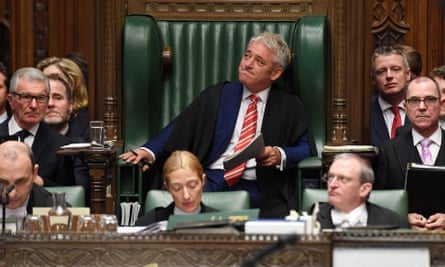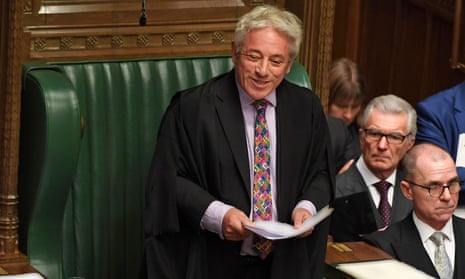After just over a decade as Speaker and an estimated 14,000 throaty cries of “Order!”, it was perhaps typical of John Bercow that his final day in the Commons featured not only lengthy tributes but a brutal row with an MP conducted with his trademark icy passive-aggression.
Bercow, possibly the most high-profile modern Speaker, and certainly the most interventionist and divisive, had faced what was, by recent standards, a relatively low-key day in the chamber.
It was during one of these – a half-hour debate on endorsing a disciplinary report on the Labour MP Keith Vaz – that Bercow found time for a final disagreement with one of his many long-time foes, Andrew Bridgen.
After the Tory MP used his speech to accuse Bercow of being too lax over Vaz, the Speaker ordered Bridgen to sit down, admonishing him for “extreme folly as well as sheer nastiness”.
Bridgen sarcastically thanked Bercow for his “help and advice”, but was again stopped in his tracks. “Don’t mix it with the chair,” Bercow fumed, face fixed into what Boris Johnson had half-affectionately described the day before as his “Tony Montana scowl”, a reference to Al Pacino’s character in Scarface.
The paradox of this ferocious set-to was that it came almost immediately after MPs had spent slightly under three hours lavishing praise on Bercow.
Some tributes were notably arch, such as when Jacob Rees-Mogg, the Commons leader, assured Bercow that his much-used arcane verbs such as “chuntering” were “now in common parlance in pubs and clubs across England”.

But others were hugely sincere. Rosie Duffield thanked Bercow for his kindness to her family when she was sworn in as the 2017-elected Labour MP for Canterbury, saying her father, who has Alzheimer’s, still repeatedly talks with fondness of the day.
It was, overall, probably a fitting swan song for the 157th Speaker, who is standing down at December’s election after 22 years in the Commons, the first dozen as a Tory MP and shadow minister.
While Bercow took over amid the furore of the MPs’ expenses scandal, his prominence has grown since the 2016 Brexit referendum, where he has proved a regular thorn in the side of government, allowing backbench MPs significant scope to shape – some critics would say obstruct – the departure process.
Commons-watchers say Bercow has reshaped the role of his office, for example with the huge increase in urgent questions to ministers. “I think he’s changed the nature of the role,” said Ruth Fox, director of the parliamentary research group the Hansard Society.
Bercow’s greatest impact was perhaps “in making parliament a more outward-facing institution”, Fox said, such as his work with the education centre and youth parliament.
Even his notoriety must be seen in the political context of the era, she added: “He’s a Speaker who for three-quarters of his time in office has presided over a hung parliament. He’s had to make decisions at a time when political parties are fragmented, and haven’t really operated in parliament as they normally do.
“We’ll only really get a sense of his record and his reputation when he’s gone and we see how his successor fares. Because if his successor faces some or all of these same challenges, we’ll see how they deal with it.
“We’ll also see if backbench MPs are happy if his successor is less inclined to defend their rights and more inclined to allow the executive an easier ride.”

There are, however, some more obviously troubling aspects to Bercow’s tenure. He has been accused by former aides of bullying. He vehemently denies the claims, but his departure means the investigatory process could stop.
And while Bercow’s colourfully-worded put-downs might have earned him a global audience, some MPs vehemently dislike what they say can be a bullying, condescending manner in the chair.
Labour’s Chris Bryant, among nine MPs seeking to replace Bercow in an election process scheduled for Monday, told the Guardian last week he had recently walked out of the Commons chamber as he disliked the way the Speaker was chastising one Conservative.
What seems clear is that whatever of Bercow’s procedural innovations remain under a new Speaker, their style will be different. It is perhaps no surprise that the two favourites are Lindsay Hoyle and Eleanor Laing, both deputy Speakers, who are known quantities and significantly more understated in their approach.
As for Bercow, who has three school-age children, he must now vacate the lavish apartment inside parliament that comes with the job, and at the age of 56, seek a new career.

Previous Speakers have been made peers, but several government briefings have indicated that Bercow will be denied this. However, the attention-grabbing manner that perhaps played a role in this could bring an alternative path, with several reports that he will be in demand on the US lecture circuit.
Those up for the Speaker’s job
Lindsay Hoyle: the Labour MP for Chorley since 1997, and a deputy Speaker since 2010, he is seen as the front-runner for the post.
Eleanor Laing: another deputy Speaker, Laing is a Conservative, and is MP for Epping Forest. She could pip Hoyle to the job.
Chris Bryant: a popular Labour backbencher and self-professed Commons geek – he has written a two-volume history of parliament – Bryant is another possible winner.
Rosie Winterton: also a deputy Speaker, since 2017, Winterton was formerly Labour’s chief whip.
Harriet Harman: the longest-serving female MP and a reformer of its procedures for decades, the Labour MP has campaigned energetically but is now seen as perhaps an outsider.
Meg Hillier: an east London Labour MP, she chairs the influential Public Accounts Committee.
Edward Leigh: veteran Tory backbencher – he has represented Gainsborough since 1983.
Henry Bellingham: a Tory of the same vintage, being MP for North West Norfolk since 1983.
Shailesh Vara: yet another Conservative. MP for North West Cambridgeshire since 2005 and a former Northern Ireland minister.
